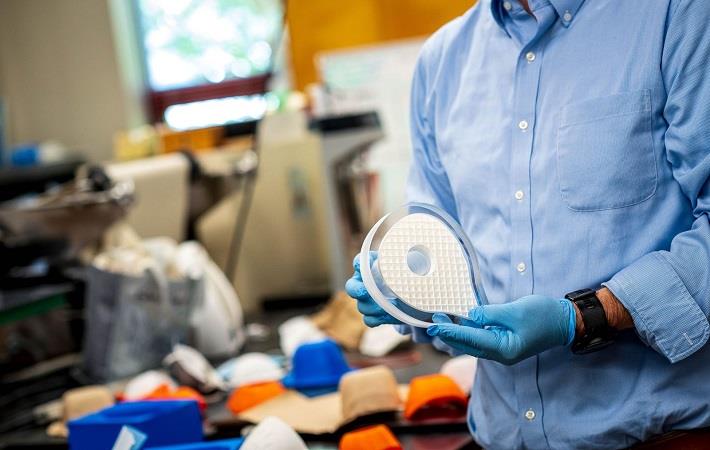
“With escalating tensions during a pandemic, international supply lines for medical masks can break down, creating local shortages,” said researcher Johan Foster, a chemical and biological engineering associate professor in the faculty of applied science. “When we decided to design a mask back in March, we knew early on we wanted a solution that uses local materials, is easy to produce and inexpensive, with the added bonus of being compostable and biodegradable.”
The new mask—dubbed Canadian-Mask, or Can-Mask—ticks all those boxes, says Foster, who’s also the Natural Sciences and Engineering Research Council of Canada (NSERC) Canfor Industrial Research Chair in Advanced Bioproducts at UBC.
The mask frame is made entirely from Canada's westernmost province of British Columbia wood fibres from sources such as pine, spruce, cedar and other softwoods. One prototype uses a commercial N95 filter on the front of the mask, the other uses a filter specially designed by the UBC team from wood-based products. "Both prototypes are currently being tested to ensure they meet health industry specifications for fit and permeability, with plans to apply for Health Canada certification in the near future," UBC said on its website.
The researchers believe the mask is a good alternative to the synthetic masks currently in use. “With millions of disposable masks and gloves already polluting city sidewalks and potentially entering our rivers and oceans, we urgently need a biodegradable option to avoid making a massive impact on our environment,” said Foster.
“If COVID-19 has taught us anything, it’s how important it is to have a robust supply of protective equipment like N95 respirators and surgical masks,” says chemical and biological engineering professor Orlando Rojas, scientific director of the BioProducts Institute and a faculty member with UBC’s faculty of forestry, faculty of applied science and faculty of science. “The Can-Mask is a promising solution, as it pairs British Columbia wood—a marvellous material with future potential for advancing our future bioeconomy and creating jobs—with British Columbia industry expertise and technology developed and tested right here at UBC.”
Developing the mask took the combined efforts of a multidisciplinary team that included researchers from the faculties of applied science, forestry and science at UBC.
Mask prototyping is nearly complete, and a shift to cost-effective scaling and production is in the plans.
Fibre2Fashion News Desk (RKS)